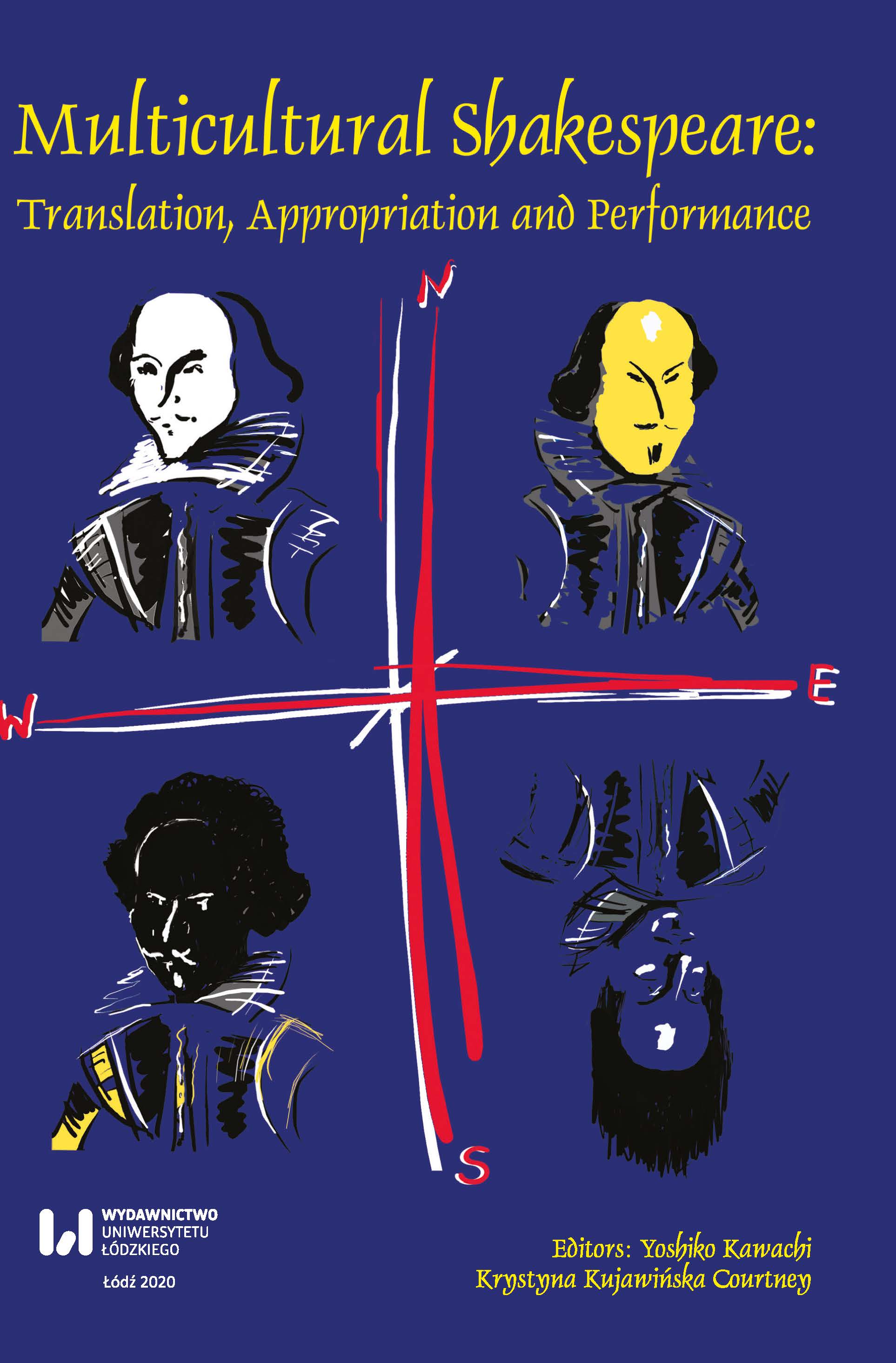Leaving Readers and Writers in Peace: Translation of Religious Terms of Shakespeare’s "Coriolanus" into Arabic considering Venuti’s Invisibility
DOI:
https://doi.org/10.18778/2083-8530.21.08Keywords:
DTS, Religious Terms’ Translation, Translated Literature, Translator’s invisibility, Translator’s visibilityAbstract
This paper is an endeavour to examine the translation of religious terms (praying and oath words) in Shakespeare’s Coriolanus pertaining to two translations by Muhammad al-Sibā‘ī (1881-1931) and Jabra Ibrahim Jabra (1920-1994) into Arabic. This paper seeks to ascertain whether the translators opt for leaving readers in peace and bringing source text (ST) writers’ home or leaving writers in peace and sending target text (TT) readers abroad. The study is based on the theoretical framework of Descriptive Translation Studies (DTS) and the pivotal role the translated literature as facts of the target culture in the poly-system of world literature. The study reveals that each of these translations represents a specific strategy in translation. Visible translator is mostly adopted by Jabra Ibrahim Jabra and invisible translator is mostly adopted by Muhammad al-Sibā‘ī.
Downloads
References
Al-Ali, Kadhim and Mohammed Le’ibi. “Analytical Study of Schleiermacher’s Essay ‘On Different Methods of Translating.”’ Adab Al-Basrah Journal. Iraq: Ministry of Higher Education and Scientific Research, 2018. (84): 1-35.
Google Scholar
Al-Mousawi, Nahrain. “Bourdieu in Translation Studies: The Sociocultural Dynamics of Shakespeare Translation in Egypt by Sameh Hanna.” Critical Survey and Berghahn Books, 2016. (28) 187-191. doi.org/10.3167/cs.2016.280314.
Google Scholar
DOI: https://doi.org/10.3167/cs.2016.280314
Amin-Zaki, Amel. “Religious and Cultural Considerations in Translating Shakespeare into Arabic.” Between Languages and Cultures: Translation and Cross-Cultural Texts. Eds. Anuradha Dingwaney and Carol Maier. Pittsburgh: University of Pittsburgh Press, 1995. 223-243.
Google Scholar
Ballouta, Issa. “Living with the Tigress and Muses: An Essay on Jabrā Ibrahim Jabrā.” World Literature Today, 2001. 75 (2): 214-223. doi.org/10.2307/40156520.
Google Scholar
DOI: https://doi.org/10.2307/40156520
Bassnett, Susan. Translation Studies. London: Routledge, 2002.
Google Scholar
Casagrande, Joseph. “The Ends of Translation.” International Journal of American Linguistics, 1954. 20: 335-340.
Google Scholar
DOI: https://doi.org/10.1086/464296
Cercel, Larisa, Radegundis Stolze, and John Stanley. “Hermeneutics as A Research Paradigm.” Translational Hermeneutics: The First Symposium. Eds. Radegundis Stolze, John Stanley and Larisa Cercel. Bucharest: Zeta Books, 2015.
Google Scholar
DOI: https://doi.org/10.5840/zeta-translational20152
Even-Zohar, Itamar. 1990. “The Position of Translation Literature within the Literary Polysystem.” The Translation Studies Reader. Ed. Lawrence Venuti. London: Routledge, 2004. 192-197
Google Scholar
Ghazoul, Ferial. “The Arabization of Othello.” Comparative Literature. Duke University Press on behalf of the University of Oregon Stable URL: http://www.jstor.org/ 1998. 50 (1): 1-31.
Google Scholar
DOI: https://doi.org/10.2307/1771217
Hanna, Sameh. “Decommercializing Shakespeare: Mutran’s Translation of Othello.” Critical Survey, 2007. 19 (3): 27-54. doi.org/10.3167/cs.2007.190303.
Google Scholar
DOI: https://doi.org/10.3167/cs.2007.190303
Hatim, Basil and Ian Mason. Discourse and the Translator. London: Longman, 1990.
Google Scholar
Holmes, James. 1954. “The Name and Nature of Translation Studies.” The Translation Studies Reader. Ed. Lawrence Venuti. London: Routledge, 2012. 172-185.
Google Scholar
Larsen, Mildred. Meaning-Based Translation: A Guide to Cross Language Equivalence. London: University Press of America, 1984.
Google Scholar
Lefevere, André. Translation History Culture: A Sourcebook. London: Routledge, 2003.
Google Scholar
DOI: https://doi.org/10.4324/9780203417607
Mattar, Karim. “Orhan Pamuk and the Limits of Translation: Foreignizing the Black Book of World Literature.” Translation and Literature. Edinburgh: Edinburgh University Press, 2014. (23): 42-67. doi.org/10.3366/tal.2014.0135.
Google Scholar
DOI: https://doi.org/10.3366/tal.2014.0135
Munday, Jeremy. Introducing Translation Studies: Theories and Applications. London: Routledge, 2012.
Google Scholar
DOI: https://doi.org/10.4324/9780203121252
Newmark, Peter. A Textbook of Translation. New York: Prentice Hall, 1988.
Google Scholar
Nida, Eugene. Toward a Science of Translating. Leiden: Brill, 1964. Quran.com
Google Scholar
DOI: https://doi.org/10.1163/9789004495746
Schleiermacher, Friedrich. 1813. “On the Different Methods of Translating.” Trans. Susan Bernofsky. The Translation Studies Reader. Ed. Lawrence Venuti. London: Routledge, 2012. 43-63.
Google Scholar
Shakespeare, William. Coriolanus. https://www.folgerdigitaltexts.org/html/Cor.html (act, scene, line).
Google Scholar
Tageldin, Shaden. Disarming Words: Empire and the Seductions of Translation in Egypt. Berkeley: University of California Press, 2011.
Google Scholar
Venuti, Lawrence. The Translator’s Invisibility: A History of Translation. London: Routledge, 2004.
Google Scholar
Shakespeare, William. Coriolanus. Trans. Muhammad al-Sibā‘ī. Cairo: al-Talif Press, 1911.
Google Scholar
Shakespeare, William. Coriolanus Tragedy. Trans. Jabra Ibrahim Jabra. Kuwait: Ministry of Information, 1974.
Google Scholar
شكسبير، وليام. كوريولانس. ترجمة محمد السباعي. القاهرة : مكتبة التأليف، 1911 .
Google Scholar
شكسبير، وليام. مأساة كوريولانس. ترجمة جبرا ابراهيم جبرا. الكويت : وزارة الاعلام، 1974 .
Google Scholar
Downloads
Published
How to Cite
Issue
Section
License

This work is licensed under a Creative Commons Attribution-NonCommercial-NoDerivatives 4.0 International License.












